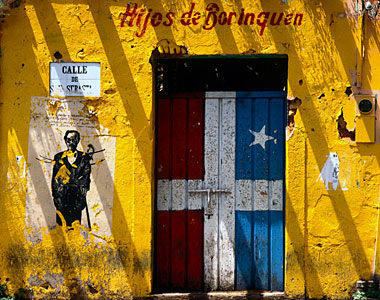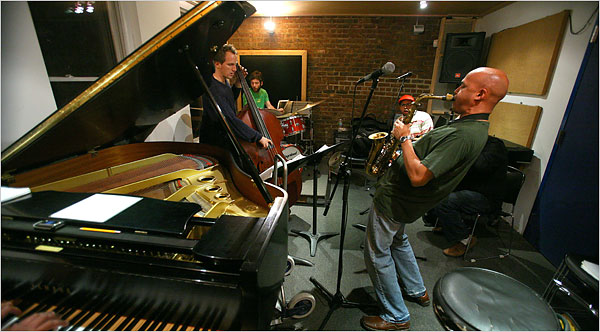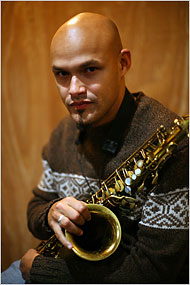Avelino was ordered extradited to Connecticut today to stand trial for the legendary Wells Fargo heist of 1983, an act that the Macheteros took credit for. FBI Criminal & Division Head Luis Fraticelli says that the FBI’s arrests against the organizations’ leaders will continue, so let us be prepared to continue supporting our freedom fighters, who are fighting for the freedom of a colony, even as the White House admits & officially adopts the position that Puerto Rico is a colony…JO
Ordenan extradicion de Gonzalez Claudio
Prensa Asociada
11 Feb 2008
Pese a que el presunto machetero Avelino González Claudio pidió que se le juzgue en Puerto Rico y se describió como un “prisionero político”, el magistrado federal Marcos López ordenó hoy, lunes, su extradición a Hartford, Connecticut, en un procedimiento judicial generalmente automático.
La defensa de González Claudio también denunció ante el togado que su cliente está recibiendo “trato inhumano” en la cárcel federal porque se le mantiene en una celda en la que se le selló la única ventana con una plancha de metal para impedirle ver la luz del día.
La portavoz del Centro Metropolitano de Detenciones en Guaynabo, Migdalia Torres, aseguró en una carta remitida a Prensa Asociada que, en el penal, se están reparando algunas de las celdas y que esos trabajos pueden requerir que se tapen sus ventanas temporalmente.
Y negó que González Claudio reciba un trato especial o diferente al de los demás reclusos.
“El tratamiento al reo González Claudio no es diferente al que recibe cualquier otro recluso en espera de juicio y con las mismas necesidades de seguridad”, aseguró Torres en la misiva.
El acusado fue arrestado la semana pasada por supuestamente participar en el robo de 7 millones de dólares de un camión blindado de la compañía de transporte de valores Wells Fargo en Hartford, Connecticut, el 12 de septiembre de 1983.
González Claudio aceptó el lunes que responde a ese nombre, aunque a través de su representación legal dejó establecido que no reconoce la autoridad de la corte estadounidense en la Isla para extraditarlo.
“Avelino González Claudio no niega su identidad. Este ciudadano puertorriqueño frente a usted es Avelino González Claudio”, dijo el licenciado Juan Ramón Acevedo Cruz, principal abogado de defensa del supuesto miembro del Ejército Popular Boricua-Los Macheteros, al magistrado López.
“En cuanto al asunto de la extradición, nosotros vigorosamente objetamos cualquier intento del gobierno de Estados Unidos de remover a González Claudio de su isla de Puerto Rico”, agregó el letrado en la vista de identificación del acusado.
El fiscal federal José Ruiz indicó a la AP que la extradición podría tardar más de 20 días y que generalmente si en Puerto Rico no se impone una fianza en la jurisdicción donde será trasladado permanecería encarcelado.
“Si se impone fianza aquí, allá generalmente lo honran”, indicó Ruiz. Según Acevedo, como “prisionero político”, González Claudio reclama su potestad, al amparo del derecho internacional, de permanecer en su tierra natal.
El abogado reclamó, además, que el gobierno estadounidense cumpla con la Resolución 1514 de la Asamblea General de la Organización de las Naciones Unidas (ONU), que declara el colonialismo como “la negación de un derecho humano fundamental”.
“Desde 1972, el Comité Especial de Descolonización de las Naciones Unidas ha reconocido el derecho inalienable de los puertorriqueños a la autodeterminación y la independencia de acuerdo con la Resolución 1514”, agregó el abogado citando la resolución.
La defensa también solicitó una vista de fianza, que fue señalada por el magistrado para el 21 de febrero a la 1:30 de la tarde.
La fiscalía federal, representada por Ruiz y Carlos Cardona, no objetó que se le garantice la vista de fianza al sospechoso.
Pidió con éxito que González Claudio permanezca encarcelado en la institución federal de Guaynabo por considerarlo un “riesgo de fuga” y “un peligro para la comunidad” porque usó nombres falsos por 22 años y por la naturaleza de los delitos que se le imputan.
Sobre la denuncia de trato inhumano, el magistrado dijo que eso no sería jurisdicción de la corte.
Ante los reclamos del abogado para poder ver a González Claudio en un cuarto de visitas de la cárcel y no en un salón de conferencias donde no tiene privacidad, y para que se le quiten las esposas y pueda firmar documentos, el magistrado le respondió que hiciera los arreglos pertinentes con el Negociado federal de Prisiones.
Le indicó que si la situación persiste entonces el tribunal podría intervenir.
Mientras la vista se llevaba a cabo, frente al edificio federal en Hato Rey hubo una protesta de organizaciones independentistas.
“Esta corte representa los intereses del imperio y van a seguir fielmente la orden de Washington, pero vamos a dar todas la batallas legales para que se quede aquí”, expresó Osvaldo González Claudio, hermano del acusado.
Agregó que abriga la esperanza de que su pariente sea juzgado “por sus pares” y no en Connecticut.
Subject: TORTURE/TORTURA OF/DE MACHETERO
To: panamaglobaljustice@lists.riseup.net
Coordinated protests were held today in New York and San Juan to protest the Gestapo FBI’s kidnapping of this freedom fighter…
Torture of Machetero denounced
MINH alleges that the “different treatment” González Claudio is receiving is intended to “soften” him.
By The Associated Press
February 11, 2008 El Nuevo DÃa
SAN JUAN – The co-chair of the National Hostos Independence Movement, (MINH), Héctor Pesquera, denounced today the fact that federal prisoner Avelino González Claudio, linked to the clandestine group The Macheteros, is supposedly being tortured in the federal detention center in Guaynabo where he has been confined since he was arrested on Wednesday [sic].
“We have information that they have already started to torture him, covering up the windows so he cannot know whether it’s day or night,” said Pesquera in a radio interview (WSKN).
Pesquera, a doctor by profession, said that the supposed “different treatment” González Claudio is receiving in the jail is meant to “soften him, preparing to break his will.”
Asking about the matter, governor AnÃbal Acevedo Vilá said that any allegation of mistreatment must be “immediately” taken to the highest levels of federal jurisdiction by González Claudio’s attorneys.
However, he said that in Puerto Rico, “let’s not fool ourselves. Here, historically, federal and state authorities… the way they treated independentists was very different from the way they treated other citizens.”
Immediately, Migdalia Torres, public information officer at the federal jail in Guaynabo, said she had no information about Pesquera’s allegations, but promised to investigate and get back to the Associated Press.
“I’ve just arrived; I don’t have any information,” said Torres.
Pesquera pointed out that González Claudio, while clandestine for 22 years, was a teacher of computer science for the musician and comedian Silverio Pérez and a president of the Supreme Court who could not be identified.
“We know that Avelino González Claudio, during the life he lived under another name, was a very productive person for the Country,” said Pesquera.
As for the judicial process which is to continue this afternoon, Pesquera said that González Claudio will not recognize the jurisdiction of the federal court to extradite him.
“He is going to ask that he be judged here, in Puerto Rico,” said Pesquera.
“That he be judged in his own land… anything else would be kidnap,” he added.
González Claudio has an identification hearing today before being extradited to Hartford, Connecticut, where he will face charges of bank robbery, among others, related to the robbery of $7 million of a Wells Fargo deposit in that city in September of 1982 [sic].
The clandestine organization The Macheteros claimed responsibility for this robbery.
On August 30, 1985, the Federal Bureau of Investigations (FBI), arrested 11 of 17 people related the clandestine organization which claimed responsibility for the deaths of two sailors from the Sabana Seca Navy Base and for the death of a police officer, in addition to the destruction of nine Puerto Rico National Guard airplanes.
Translation of letter from Avelino Gonzalez Claudio’s Defense Committee
We extend to you our cordial greetings from Mayaguez: As we have already denounced, Comrade Avelino Gonzalez Claudio was arrested by the F.B.I. today, and will be confronting charges which will be leveled against him outside of Puerto Rico.
Avelino was one of the comrades that the F.B.I. had been unable to capture during its repressive onslaught against our movement in 1985. That period saw the imprisonment of comrades like Papo Segarra Palmer, who spent 19 years of his life in U.S. prisons.
We should not lose sight of the fact that the colonial police of Puerto Rico took part in the surveilance that was maintained against Avelino Gonzalez, and his eventual arrest. This is after all an election year, and our colonial governor is susceptible to the pressures of the F.B.I. and a Republican Party in the U.S. which despairs over the failures of its undemocratic efforts against “terrorism,” the very thing that they’re guilty of inflicting on the world.
Avelino Gonzalez Claudio is a militant who has pursued the decolonization of Puerto Rico. He is not unlike those who continued the struggle of Filiberto Ojeda, those who confronted the
U.S. navy in Vieques, or those of us who today resist the abuses of the F.B.I. in our country.
The comrades of the Frente Socialista, (Socialist Front,) the Committee for Human Rights and La Nueva Escuela, (The New School,) call for a demonstration in support of Avelino Gonzalez Claudio, on Monday February 11 2008 at 3:00PM. At that time, a hearing will be taking place at the colonial “federal” court in San Juan to discuss the extradition of the comrade to the United States. We must demand that the comrade remain in Puerto Rico.
Denuncian tortura a machetero
MINH alega que el “trato distinto” que recibe González Claudio tiene el propósito de “ablandarlo”.
Por The Associated Press
11 febrero 2008 El Nuevo DÃa
SAN JUAN – El copresidente del Movimiento Independentista Nacional Hostosiano (MINH), Héctor Pesquera, denunció hoy que el preso federal Avelino González Claudio, vinculado con el grupo clandestino los Macheteros, supuestamente está siendo torturado en el centro de detención federal en Guaynabo donde está confinado desde que fue arrestado el miércoles.
“Tenemos información de que ya comenzaron a torturarlo tapiándole las ventanas para que no sepa cuándo es de dÃa o cuándo es de noche”, dijo Pesquera en entrevista radial (WSKN).
Pesquera, médico de profesión, dijo que el supuesto “trato distinto” que recibe González Claudio en la cárcel tendrÃa el propósito de “ablandarlo, irle quebrando la voluntad”.
Cuestionado sobre el asunto, el gobernador AnÃbal Acevedo Vilá dijo que cualquier alegación de maltrato debe ser elevada a los más altos niveles de la jurisdicción federal por los abogados de González Claudio “inmediatamente”.
No obstante, dijo que en Puerto Rico “nadie puede tapar el cielo con la mano, aquà históricamente las autoridades federales y estatales… la forma en que trataban a los independentistas era muy diferente a la que trataban a otros ciudadanos”.
De inmediato, Migdalia Torres, oficial de información pública de la cárcel federal en Guaynabo dijo que no tenÃa información sobre las alegaciones de Pesquera, pero prometió indagar y comunicarse nuevamente con Prensa Asociada.
“Acabo de llegar, no tengo información”, dijo Torres.
Pesquera, por su parte, destacó que González Claudio, mientras estuvo clandestino durante 22 años, fue maestro de ciencias de computadoras del músico y comediante Silverio Pérez y de un presidente del Tribunal Supremo a quien no pudo identificar.
“Sabemos que Avelino González Claudio, durante su vida bajo otro nombre, fue una persona muy productiva para el PaÃs”, dijo Pesquera.
Sobre el proceso judicial que continúa esta tarde, Pesquera dijo que González Claudio no reconocerá la jurisdicción del tribunal federal para extraditarlo.
“Va a solicitar que se le juzgue aquÃ, en Puerto Rico”, dijo Pesquera.
“Que se le juzgue en su tierra, cualquier otra cosa serÃa secuestro”, agregó.
González Claudio tiene hoy una vista de identificación antes de ser extraditado a Hartford, Connecticut en donde enfrenta cargos de robo a banco, entre otros relacionados con el robo de $7 millones de un depósito de la Wells Fargo en esa ciudad en septiembre de 1982.
Por ese robo se responsabilizó la organización clandestina los Macheteros.
El 30 de agosto de 1985 el Negociado Federal de Investigaciones (FBI, por sus siglas en inglés) arrestó a 11 de 17 personas relacionadas con la organización clandestina que se responsabiliza por las muertes de dos marinos de la Base Naval de Sabana Seca y la de un policÃa, además de la destrucción de nueve aviones de la Guardia Nacional de Puerto Rico.
Pesquera denuncia tortura a Machetero
Lunes, 11 de febrero de 2008
El copresidente del Movimiento Independentista Nacional Hostosiano (MINH) Héctor Pesquera denunció hoy que el preso federal Avelino González Claudio, vinculado con el grupo clandestino los Macheteros, supuestamente esta siendo torturado en el centro de detención federal en Guaynabo donde está confinado desde que fue arrestado miércoles.
“Tenemos información de que ya comenzaron a torturarlo tapiándole las ventanas para que no sepa cuando es de día o cuando es de noche”, dijo Pesquera en entrevista radial (WSKN).
Pesquera, médico de profesión, dijo que el supuesto “trato distinto” que recibe González Claudio en la cárcel tendría el propósito de “ablandarlo, irle quebrando la voluntad”.
Cuestionado sobre el asunto, el gobernador Aníbal Acevedo Vilá dijo que cualquier alegación de maltrato debe ser elevada a los más altos niveles de la jurisdicción federal por los abogados de González Claudio “inmediatamente”.
No obstante, dijo que en Puerto Rico “nadie puede tapar el cielo con la mano, aquí históricamente las autoridades federales y estatales… la forma en que trataban a los independentistas era muy diferente a la que trataban a otros ciudadanos”.
De inmediato, Migdalia Torres, oficial de información pública de la cárcel federal en Guaynabo dijo que no tenía información sobre las alegaciones de Pesquera pero prometió indagar y comunicarse nuevamente con prensa Asociada.
“Acabo de llegar, no tengo información”, dijo Torres.
Pesquera por su parte destacó que González Claudio mientras estuvo clandestino durante 22 años, fue maestro de ciencias de computadoras del músico y comediante Silverio Pérez y de un presidente del Tribunal Supremo a quien no pudo identificar.
“Sabemos que Avelino González Claudio, durante su vida bajo otro nombre, fue una persona muy productiva para el país”, dijo Pesquera.
Sobre el proceso judicial que continúa en la tarde del lunes, Pesquera dijo que González Claudio no reconocerá la jurisdicción del tribunal federal para extraditarlo.
“Va a solicitar que se le juzgue aquí en Puerto Rico”, dijo Pesquera.
“Que se le juzgue en su tierra, cualquier otra cosa sería secuestro.
González Claudio enfrenta el lunes una vista de identificación antes de ser extraditado a Hartford Connecticut en donde enfrenta cargos d robo a banco entre otros relacionados con el robo de siete millones de dólares de un depósito de la Wells Fargo en esa ciudad en septiembre de 1982.
Por ese robo se responsabilizó la organización clandestina los Macheteros.
El 30 de agosto de 1985 el Negociado federal de Investigaciones (FBI en inglés) arresto a 11 de 17 personas relacionadas con la organización clandestina que se responsabiliza por las muertes de dos marinos de la Base Naval de sabana seca y la de un policía, además de la destrucción de nueve aviones de la Guardia Nacional de Puerto Rico.
Vicente “Panama” Alba
panamaalba2@yahoo.com
(917) 626-5847
“if you tremble with indignation at every injustice then you are comrade of mine.”
“Let’s be realistic, let’s do the impossible”
Ernesto “Che” Guevara



